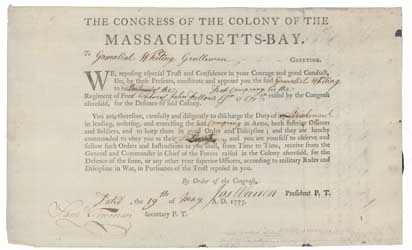The Mysterious Rise of Nathanael Greene
The clerk of the Provincial Congress kept similarly detailed notes, and that record was published in 1838.
Rhode Island’s assembly, in contrast, issued a bare-bones record of each legislative session: lists of elected and appointed officials, texts of resolutions and new laws. No specific dates between the day the assembly convened and when the session ended. No mention of failed petitions, disagreements with the upper house, committee reports, or the like.
As a result, Rhode Island’s legislative process is opaque. We know a session started on 22 April to wrap up the fiscal year and, in response to news from Massachusetts, to form a 1,500-man “army of observation.” But the only official clue to the date of that crucial resolution was how Gov. Joseph Wanton and Lt. Gov. Darius Sessions’s protest against it was dated 25 April.
Among the last actions of that legislature was:
IT is Voted and Resolved, That Mr. Nathaniel Greene be, and he is hereby, appointed in the Room of the Honorable Samuel Ward, Esq; (who is going to the Continental Congress) to wait on the General Assembly of the Colony of Connecticut, to consult upon Measures for the common Defence of the Four New-England Governments.A new assembly convened on “the First Wednesday in May,” or 3 May. The legislature continued to build up the army. With Gov. Wanton staying home, lawmakers established a committee of safety to oversee that process.
Nathanael Greene and fellow delegate William Bradford were reimbursed for “their Service, Horse-Hire and Expences” on that Connecticut trip. Simeon Potter, Greene, and Daniel Owen were made a committee to audit the accounts of a man making “Six Gun-Carriages” for the colony. There was more activity.
And then suddenly the records shows a long list of new appointments. Simeon Potter was elevated to the upper house. William Bradford went onto the committee of safety. And atop the first list of “Officers of the Army of Observation” was:
Nathaniel Greene, jun. Esq; Brigadier-General.Greene’s commission was dated 8 May, so the discussion that led to the creation of that handsome formal document must have taken place over the preceding week. But we know next to nothing about it.
We know Greene had represented the town of Coventry in the assembly for a few years. (For a while historians thought this was a different man, and indeed there were other Nathaniel Greenes active in Rhode Island affairs, but documents came to light to confirm his service.) The Greene family was enmeshed in the colony‘s politics.
We know Greene was particularly involved in the formation and training of the Kentish Guards, in Rhode Islanders’ initial response to the Lexington Alarm, and on the military committees listed above.
On the other hand, Nathanael Greene didn’t have a high rank in the colony militia. Indeed, he was only a private in the Kentish Guards, as I’ll discuss tomorrow.
Nonetheless, when the time came to go to war, the legislature promoted Greene above that unit’s captain, James Mitchell Varnum, and all other militia colonels to command its army. How that happened is an enduring mystery.
TOMORROW: Other candidates.


















